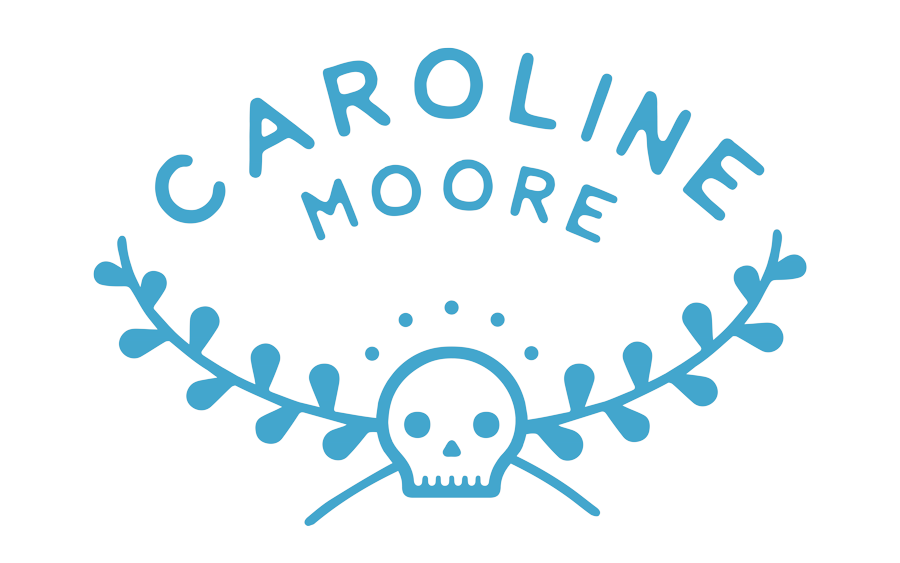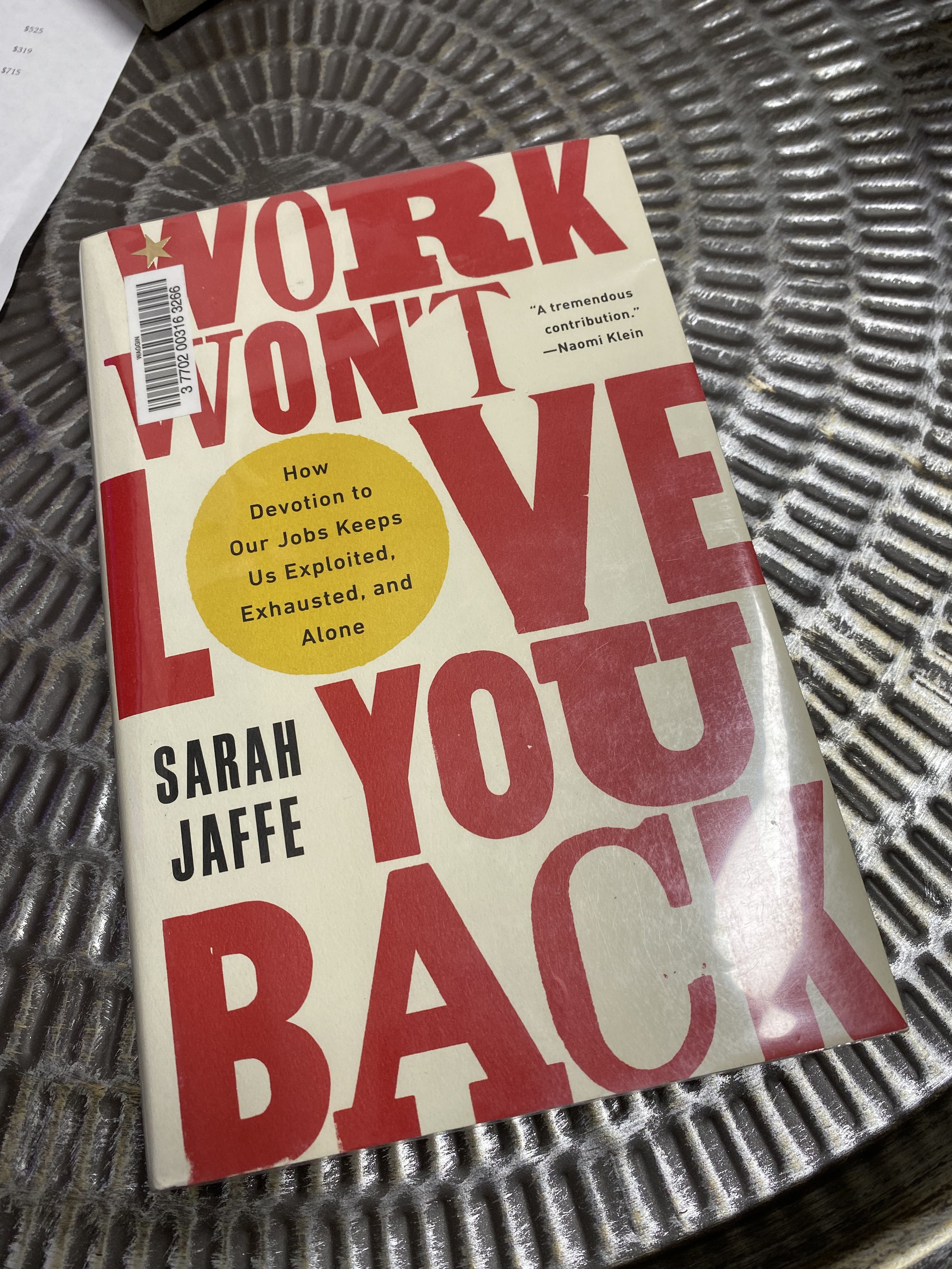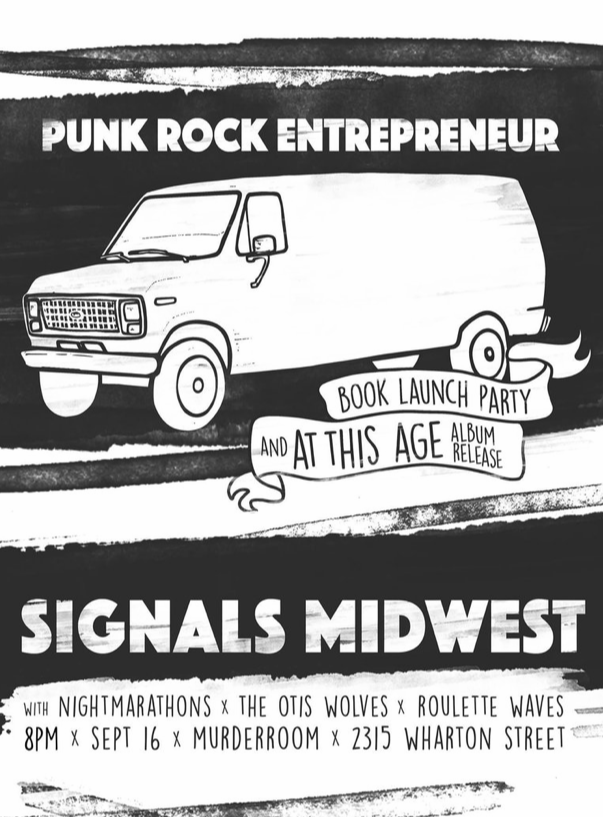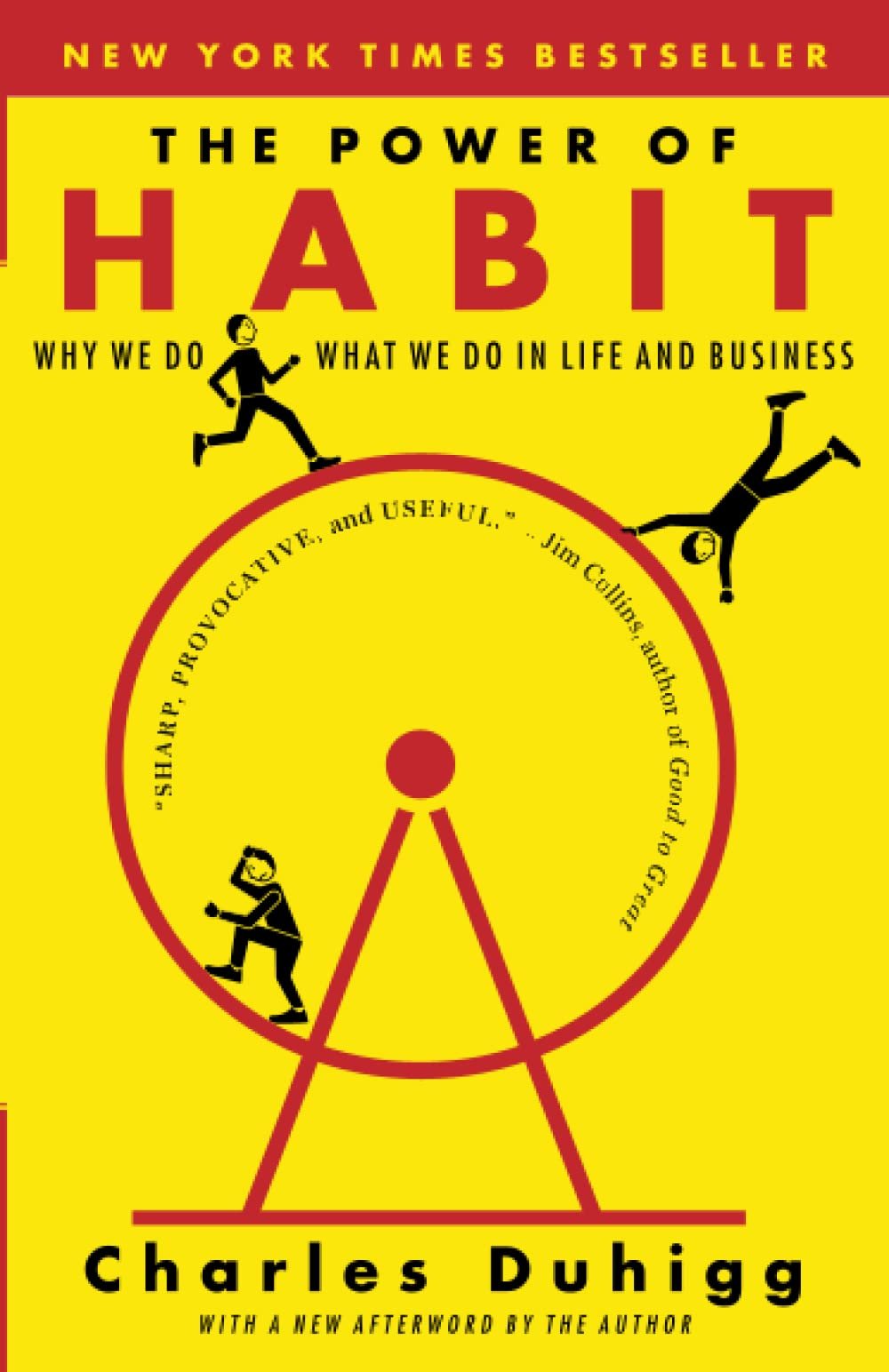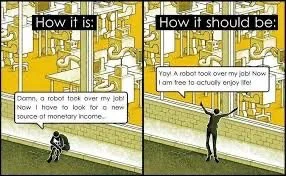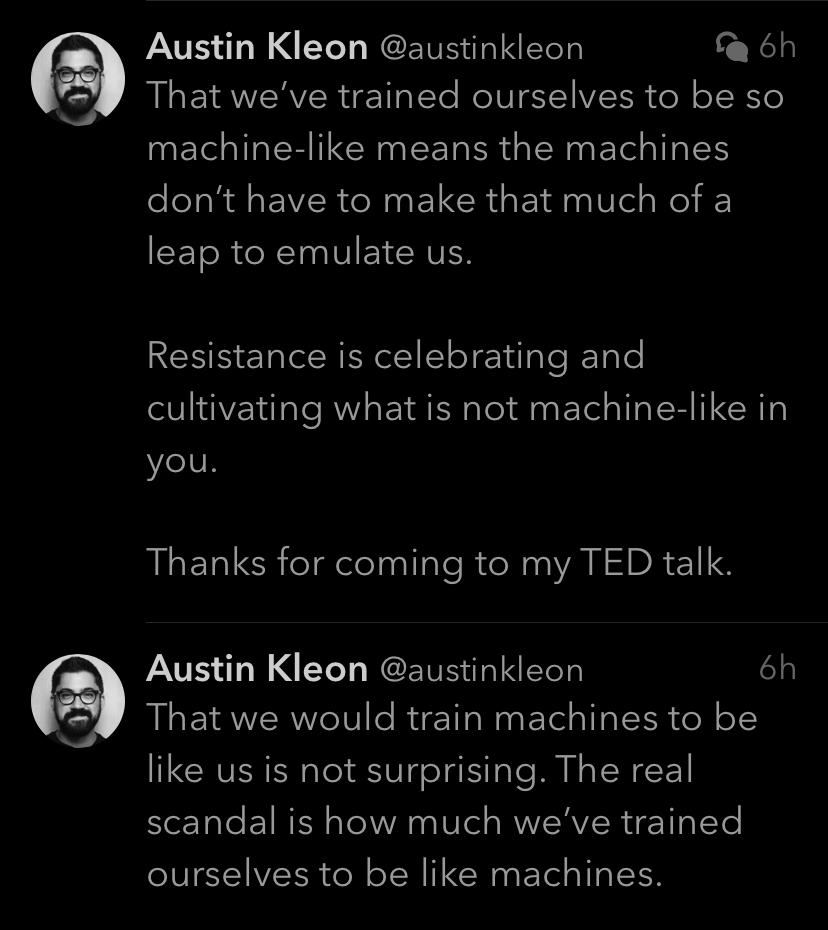
Join Tales of Interest
1,000 or so subscribers get interesting links, updates, and animated gifs sent to their inboxes every week. This could be you!
Bibliography: Can’t Even
I loved this book as much as I expected to. I’d read her original article, and this certainly feels like all the research and tangents and bonus content that just couldn’t get shoved into an article. A lot of research here went into why, specifically, shit sucks.
Bibliography: Work Won’t Love You Back
You could just keep repeating the title to yourself as a mantra. I meant to keep track of some pull quotes for these books that I’m reading as research, but by brain is just… overwhelmed. I make a lot of jokes about getting burned out whilst I’m writing a book about burnout, but that’s kind of the thing isn’t it? It’s pervasive, and it’s hard to battle even when you know better.
Bibliography: The End of Burnout
Well I guess I don’t have to write a book now? Burnout is done, everybody! (I kid, it’s a great book, you should read it.)
I don’t know how to throw a book launch.
But I do know how to throw a punk show. So in the spirit of the book, I worked with what I know.
I called up some friends, and they helped get a few more bands on the bill. I screenprinted these posters in the same space where we held the show. I didn’t do a book tour, largely because I had made a baby and a book in the same year, so this was the only event I ever hosted for Punk Rock Entrepreneur. It was a blast, and very fitting for that particular book.
Writing it at all wasn’t an accomplishment I ever expected. I wasn’t someone who had long dreamed of becoming an author, I just had some ideas that I wanted to share. And it’s a tough slog to do it, mostly because absolutely no one is making you.
I described it as assigning myself homework, but this is a bit more poetic. Anyway, I’m doing it again, even though no one is making me, again. I have more ideas, maybe you’ll like them. Maybe you won’t. I don’t know how we’ll kick this one off, since a punk show isn’t so on brand for it. Maybe I’ll have to learn something new.
Bibliography: Screaming on the Inside
This one was partly for research, but partly for funsies. Inasmuch as reading about how thoroughly this countries fails parents is fun, I mean.
Often, even if we know our own boundaries and set them, maintaining them takes extra time and work as we push against society’s expectations.
I wrote quite a lot on the subject of boundaries when I gave Burnout and the Cult of Busy as a conference talk, and I imagine it’s gonna come up pretty frequently in the new book, too. This is one of the many difficult things about setting boundaries, that other people are so resistant to them and it feels like you just have to keep resetting them.
Bibliography: The Power of Habit
One of the things that stuck out to me in the Relentless Revolution book is how many habits had to change in order for capitalism to take hold. In retrospect, so much seems inevitable, but it actually required a lot of shifts in personal philosophies about work, and how people lived their day to day lives.
There is something powerful about groups and shared experiences. A community creates belief, and that can drive a culture.
AI
I’m eons behind on the great AI art discourse, I know. This comic has come to mind repeatedly while I’ve been researching this book, and I was reminded of it again with everyone talking about AI making art. I don’t really have the bandwidth to argue about whether or not the things that these prompts create are art or not, and anyway 30 Rock settled that question for us.
“We know what art is: it's paintings of horses!”
Jack Donaghy
But I don’t feel like anyone’s hope for the future was that robots would be able to create songs, and paintings, and poetry to free us up to have more time for… I don’t know, email I guess? Aren’t robots supposed to do the drudge work of living, so that we can get on with the fun stuff?
It’s distressing. Aside from missing the mark on what we may have hoped the robot uprising would look like, art is a source of income for many of us. Humans won’t stop making art simply because a robot can do it. We’ve continued to make photorealistic paintings and drawings even though cameras exist, and we’ll keep making illustrations even though a computer can do it. Humans can’t help but to make art, and they’ll keep at it. But it’s a livelihood, and I wonder what will be the future of it. People have retrained and pivoted when the industrial revolution came and machines started to do the work we used to. When personal computers became available, most people saw them as a fad. A fun little novelty. I remember a graphic design professor telling me that he blew off his computer classes in college, because “no one was ever going to use one of those things for design.”
So I get it, people adapt. They adapt to new technology, and if they don’t, new technology will simply mow them down. Having read so much on the history of work, though, I wonder what the future of work will look like. Is all of it just coding? Is AI prompting going to become a job like social media manager did? Is anyone ever going to pay me to illustrate something with my human hands again? Did ChatGPT write this? I have a lot of questions, but no answers. I’ll leave you with this.
Bibliography: Relentless Revolution
I’m doing a lot of research for this book. I did a fair bit of research for the first one, but a lot of it is just like… my opinion, man. Since I’m citing more sources this time, I thought I’d share some of the books I’m pulling facts from. This one is pretty dense for my needs, I’m not planning to get this in the weeds about the roots of capitalism, but I did want to have a bit of background on how we got to where we are now.
Capitalism is simply a historical development and not a discovery of universal principles or an inevitable outpouring of human nature.
Fuzz
austinkleon.com
I’ve long been a fan of distortion. I like a basement recording, a flyer that’s been xeroxed a few times too many. I like grit and grain and the evidence of effort. There’s a little chart that Austin Kleon shared that resonated with me, although a lot of those things that I love fall into the unintended imperfection category, at least originally. Trying to capture that feel now, like adding grain to a digital photo, is aiming for deliberate imperfection. I’ve never seen this feeling put into better words, though, than this Brian Eno quote –
““Whatever you now find weird, ugly, uncomfortable, and nasty about a new medium will surely become its signature. CD distortion, the jitteriness of digital video, the crap sound of 8-bit… all of these will be cherished and emulated as soon as they can be avoided. It’s the sound of failure… the sound of things going out of control, of a medium pushing to its limits and breaking apart. The distorted guitar sound is the sound of something too loud for the medium supposed to carry it. The blues singer with the cracked voice is the sound of an emotional cry too powerful for the throat that releases it. The excitement of grainy film, of bleached-out black and white, is the excitement of witnessing events too momentous for the medium assigned to record them.” ”
There’s a Comeback Kid song that I love, where the singer pushes so hard he goes a little sharp, and it sounds better that way. The sound of failure. Beautiful.
Drug roulette
I don’t actually know how long I’ve had rheumatoid arthritis. I do know that when Hank was about four months old, my symptoms got bad enough that I noticed them, was bothered by them. If you’ve scrolled through my twitter, you’ve seen me complain about it. My hands ached all the time. When I woke up in the morning, my feet felt like all the tiny bones were broken. I urgently needed to sleep, but of course every time I mentioned that to a doctor I’d laugh it off like “oh, but I have two kids so… you know.” I remember a cartoon about first time moms taking their babies into the pediatrician, and how the process can make you feel crazy, because it’s either “oh, this is nothing” or “why didn’t you come in sooner?” When you don’t have a baseline for normal, it’s hard to tell what merits a doctor’s visit, and the angst over it is even worse when you factor in what an incorrect guess is gonna cost you (yeah, that’s totally fine, absolutely nothing at all, that’ll be $145.) Lyme Disease threw a million weird symptoms at me over the course of a decade, and I just got used to being a person who was exhausted and in pain and would sometimes be hit by some truly bizarre symptoms. That’s my baseline for normal.
I knew it was a thing that wouldn’t go away, though. I knew it had already gotten worse inside the space of a few months. I knew it made it incredibly difficult to do things I needed to do every day, like change diapers. Do you know how much you use your thumbs when you’re moving a baby around? A ton, it turns out, which I only discovered once I couldn’t use them. I still dragged my feet about seeing my GP, though, because I dreaded going through the specialist shuffle again. It took six years and what felt like a thousand medical tests and visits with ologists for someone to diagnose my Lyme. I saw everybody, and I did every test. I did one, which I fondly called the ol’ poke n’ zap (they put a needle into your muscle and then shock you with that needle) three times. Everything about it is exhausting, and it also sucks up an absolute ton of your time. Researching doctors, making appointments, sitting in waiting rooms, following up on referrals, getting all of these many tests and lab slips completed and then running down results. Specialists can never see you until three months from now, no matter when ‘now’ is, and if you end up with a shitty one, you have to fire them ans start all over again. Did the first office send over your scans? They never do. I resented all the time wasted, and was exhausted in advance about having to do all of this waiting and testing and waiting before I could even hope to maybe get some relief.
I’ve learned a couple of things from a decade of being what felt like a professional patient. I’m a lot faster to fire a terrible doctor, for starters. The first doctor I saw about the RA wanted me to do PT. I have nothing against physical therapy as a concept, in fact I’d already done months of it, and was still doing exercises at home that weren’t helping. When I told her all of that, she… said that she wanted me to do PT. But more, though, I guess. We’d wait and see, and in six months we could revisit the idea of medications. I said that I’d take that under advisement and immediately scheduled an appointment with another rheumatologist. He said that I definitely have some kind of inflammatory arthritis, that it’s most likely RA, and that patients do better long term when treated aggressively early on.
The nature of the disease, and the nature of the medications used to treat it, means more wasted time regardless. Basically any medication for it – DMARDs, biologics, JAK inhibitors, I’ve learned all the classes – takes three to six months before you can declare it a success or a failure. Three months isn’t so long in the grand scheme of a life, I know. But parenting small children means being assaulted with the passage of time every day. Three months to a toddler is a whole cycle of development. I look at photos of our big kid from six months ago, and he looks so small. It’s also a long time to be in pain, daily, constantly. It’s a crap shoot, there’s no way to know if a medicine will help or not. There’s no test for that. You start the thing, you wait three months, and then a doctor asks you “well, do we give it another three months?” And truly, how the hell should I know?
At my last visit, I talked to my doctor about commercial people. The people with moderate to severe rheumatoid arthritis, who asked their doctor about Xeljanz. They’re mountain biking, and moving boulders around their gardens, and laughing in the sunshine. Those people are never just muddling through a day, they never have to ask their husbands to tie their shoes for them. They can open all the jars they want. They put baseball spikes on their kids’ feet without breaking down into tears. So I asked my doctor what the goal is for these medications, are we looking at harm reduction or is it a reasonable goal to be able to live like the commercial people? He said remission looks like mountain biking, and gardening, and sunshine. But there’s a catch, of course there’s a catch. If I give up my Humira that’s helping some (but not enough), to try something new, I may not be able to go back to it. Like an ex-boyfriend, it resents me moving on and won’t work anymore. Things might get better, or they might get worse, and I won’t know for three to six months. High stakes gambling, but make it healthcare.
Toddler Scraps
My toddler gives me scraps. I made a sandwich, for me, which he commandeered and then offered the crusts back. He gives me scraps of food, scraps of time, little scraps of brain space.
Hustle culture and caregiving don’t go together. Kids, little kids particularly, demand a lot of brain space, and the time that they require is totally non-negotiable. They need food, and diaper changes, and Mickey put on the TV, and attention, and they have questions, and usually these things come rapid fire in 10 second intervals. Our big kid, who will be 7 soon, is a lot more capable of entertaining himself and acquiring snacks of questionable nutritional value on his own these days. But the toddler needs me, often.
Aside from just the actual time spent on tasks, he also needs me to respond to a thousand statements and questions and thoughts of his own every day, because I’m supposed to be teaching him things. All of these little pings – Where is the blue car? This one is Chuggington. Look, a bird! Sing itsy bitsy – they’re all opportunities for him to learn, and they also make it nearly impossible for me to organize a thought. He is always talking, it’s how he organizes his own thoughts about the world. I remember reading an essay on early parenthood that said something like “tried to fold laundry, but meat suit has forgotten shapes.” I often feel kinship with meat suit, although I think I’ve kept my grasp on rectangles. My brain is a busy space, these days, and it doesn’t lend itself to a lot of analytical thought.
These things are on my mind because I’m trying to write a book, and I know I’m not the first parent on this planet to have accomplished such a thing, so I know that it’s possible. But I also know it’s a difficult thing to do in scraps. It’s a thing done best with chunks of focused time, which is something toddlers simply cannot allow. It’s actually taken me weeks to even write this little rambling blog post. There seem to be two options for the brave souls who have attempted this anyway.
The first is to just put in more hours. Once you’re off the clock for caregiving (i.e., your child has fallen asleep) you work into the wee hours, or maybe you wake up in the wee hours well before them. You add on another 2, or 3, or 5 hours onto your day. Which is hustle culture gold. The rise and grind crew go nuts for this kind of advice, simply wake up at 3am and work until your kids get up at 7am. If you want a thing badly enough, you’ll ignore your body when it says it needs rest or food or anything, really. They don’t have a ton of advice for what you’re supposed to do when 3pm rolls around, though, and you’ve been awake and working for 12 hours and you still have 5 hours until you can even consider starting bedtime. Wait, it’s summer, make that 6 hours. It’s fine, though, if you go to sleep immediately after they do, you can still squeak in 6 hours of sleep before you do it all again tomorrow.
Whether it’s because of the RA or just my general nature as a human, giving up sleep time isn’t a great option for me. In the short term I can push through, but things start unraveling quickly, and again, it puts my brain in a space that doesn’t really allow much in the way of deep or analytical thinking. Brain wants sleep. My brain is even more useless late at night after the kids are asleep, after a full day of nonstop sensory input. Brain wants quiet.
So the other option is having child care. This is an area that I wish more people were really honest about. Many people who create something great – authors, painters, entrepreneurs – aren’t quick to point to child care as something that allowed them to do their work. There was a kerfuffle about who was doing Thoreau’s laundry (his mom did). And it’s easy to say, who the hell cares? He wrote great books, what does it matter who cooked his dinner or washed his clothes? But writing great works is a great deal easier when someone else is handling the more mundane aspects of day to day life (cleaning the house, washing the clothes, cooking the food, watching the kids.) This kind of work is largely unpaid, which isn’t a thing that hustle culture values, even as it completely relies on it. Caregivers actually do a ton of hustling, all day long, but they don’t draw a paycheck. I don’t think it’s a bad thing for people to ask these questions, and to give recognition to the people who allow them to do what they do. I asked Austin Kleon how he went about going on a book tour when he had small children, and he was very honest about only being able to do such a thing because his wife was caring for those small children while he was away (he also wrote a bit about Thoreau’s laundry). I’ve also seen Melanie Lynskey thanking her nanny in an award speech, because how could she do her work without knowing that her kids were being well cared for? So there is more recognition of this, publicly, than there used to be. But there are also still parents saying “jeez, how do they do it all?” only to find out that they are not, actually, doing it all. Seeing that these people had help breaks the illusion that you’re the only one who can’t keep a house clean, mother children, feed a family, and also write the great American novel all at the same time.
Because this is our second rodeo, I know that we’re in a difficult spot currently, but that things will get easier. As our little guy gets older, he’ll spend a little more time doing his own thing, and cultivating his own deeper thoughts about railroad layouts and imaginative play. He’ll be in preschool a few days a week to learn about socializing with kids he isn’t related to. But for right now, his brain is absolutely exploding, which is amazing for his development and also keeps us very busy. For right now, I’m doing research while he’s away at my mom’s, taking notes in the scraps of time where he’s occupied. But I’m going to be sleeping at 3am, thanks.
We have a blog.
I haven’t kept a blog up in what feels like a million years. But I’m writing a new book, and I wanted to have an outlet for some things that are too long for twitter.
I kept putting this off, because writing a first post seemed like so much pressure! What kind of tone should I set, what sort of content will end up here, how often will I update it, etc. There’s a bit in my first book that I love especially, that says “you can edit a bad page, but you can’t edit a blank one.” Usually when I write anything, I start in the middle. Introductions feel so difficult, so I just skip them until I have an idea of what I’m writing and can go back to it. So I’ll just do that. Write a middle post.
I took the kids for a hike. It was a cub scouts requirement for Johnny (he’s 6, nearly 7). Hank, 2, tagged along and dad stayed home sick. It was one of those trips with kids that’s kind of magical and great, while also being just a wall to wall disaster. We started our trek with almost no water, because Johnny had… drank it, I hope? I’d filled up a sports type bottle before we left, and it was nearly empty when we arrived. It could be all over the floor of our van, I lacked the will to investigate. Hank, obviously, fell asleep in the van on the drive there. He barely registered me moving him into his stroller.
We hiked. We looked for different animals and plants, per our scout badge requirements. Tigers in the Wild, I think. Johnny pushed his brother along. He insists on pushing the stroller in a serpentine pattern, as though we’re being hunted. Going down a sort of washed out hill, he dumps the stroller over entirely, with a sleeping Hank inside. I am not gracious about it, Hank is surprisingly chill to be woken up so abruptly, sideways in the gravel. We press on, because Johnny wants to see the creek, and I know there’s an inlet close.
I had intended on just checking out the creek, but as soon as we laid eyes on it, I could tell that Johnny was absolutely dying to put his feet in there. He didn’t want to ask for anything, since he had just rolled his brother, but he was intensely excited. And I, a moron, really thought the kids would simply dip their toes in politely and that would be it. Hank doesn’t even really like to get into water, generally, but he was fully sitting in the creek. Pretending that rocks were fishies, while his decidedly non-swim diaper ballooned ever larger. Johnny splashed through the creek, made potions out of mud and leaves, and threw the biggest rocks he could lift into the water. This part of our hike was honestly lovely, the kids were so thrilled.
And then I noticed some people hovering nearby on the trail. I thought “if they’re waiting for these kids to leave, they may as well just come on down, because it’s gonna be a while.” They didn’t. After a few minutes, I saw runners come through, and the hovering people threw colored powder at them. We had wandered into a color run, which meant I would have to somehow return these completely soaking wet children to our van… through a color run. Does this stuff stain? I’d never done one. Surely I’d have to wash it out of the kids’ hair, and they hate that. I’d mentally arrived at “fuck it, let’s get colorful” when the rain started.
The kids were already soaked, but I had managed to stay dry throughout our little creek excursion. Now I was pushing a stroller along with wet hair and fogged up glasses that kept sliding off of my face. The kids ran down the trail, Hank’s diaper threatening to explode as he bounced along. We were the better part of a mile away from where we’d parked, but Johnny ran almost the whole way. I stripped the little guy down, and some unsuspecting teenage bikers walked into a disheveled lady trying to wrangle her naked toddler while folding up a jogging stroller covered in mud. I got the little guy into a new diaper, but I saw him making his mad face at me in the mirror and asked him why. “Pants,” he said. “You’re mad because you don’t have pants?” He was. But when we got home, dad put the guys in a warm bath and got them jammies, and everything was great again.
This weekend is the scout campout, and I’m sure that will all go very smoothly.

